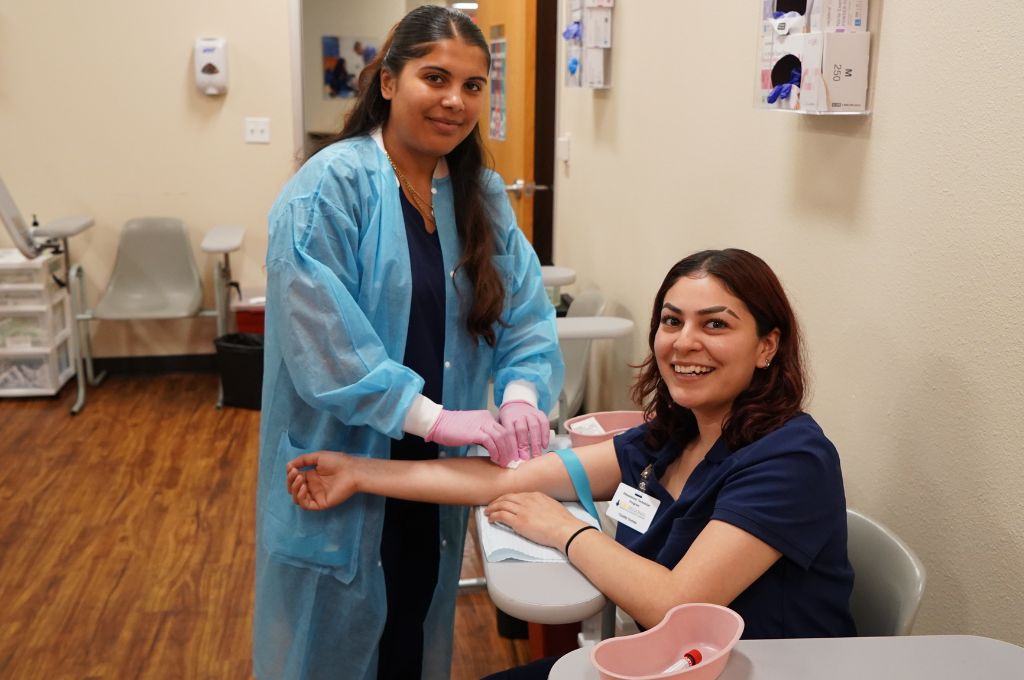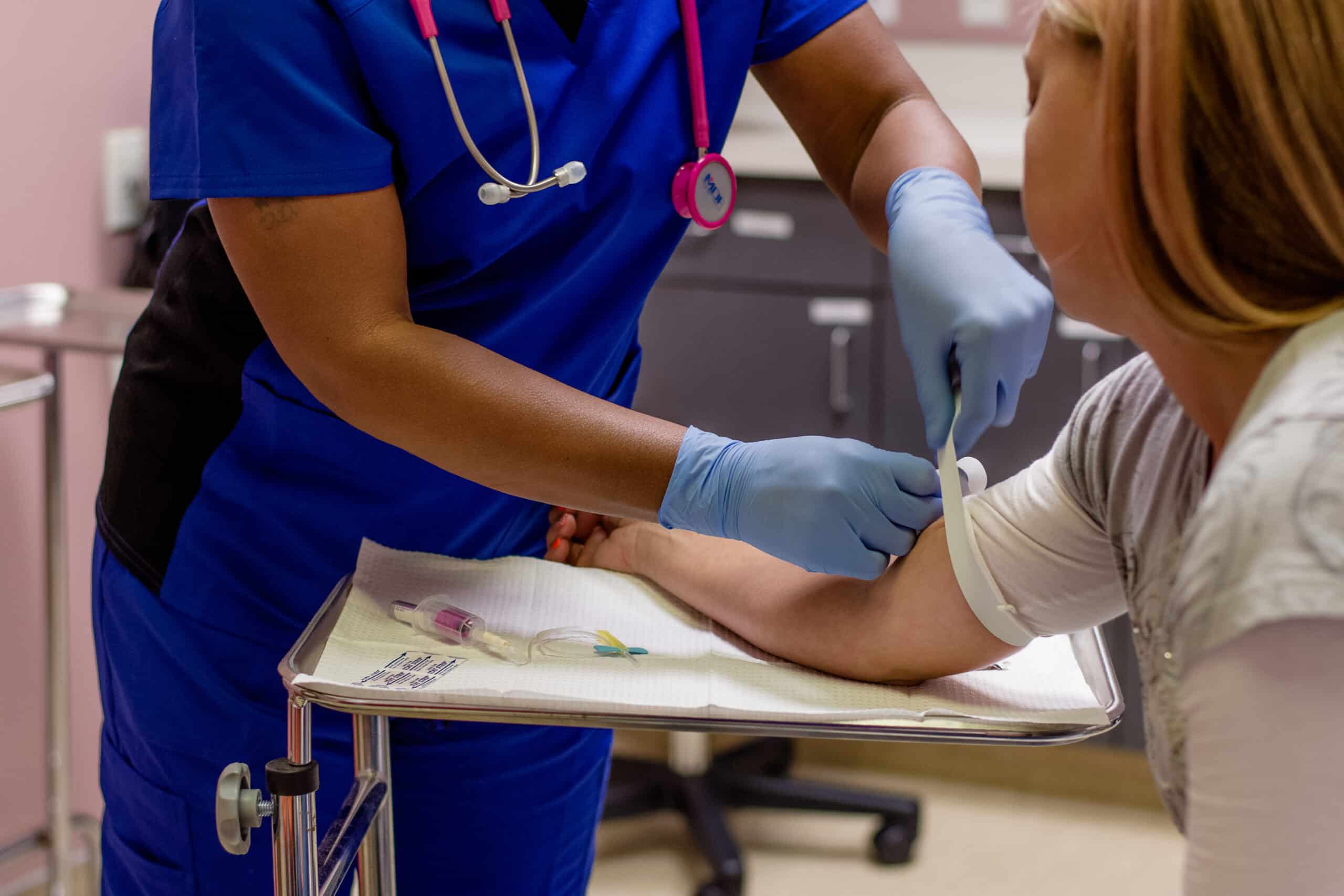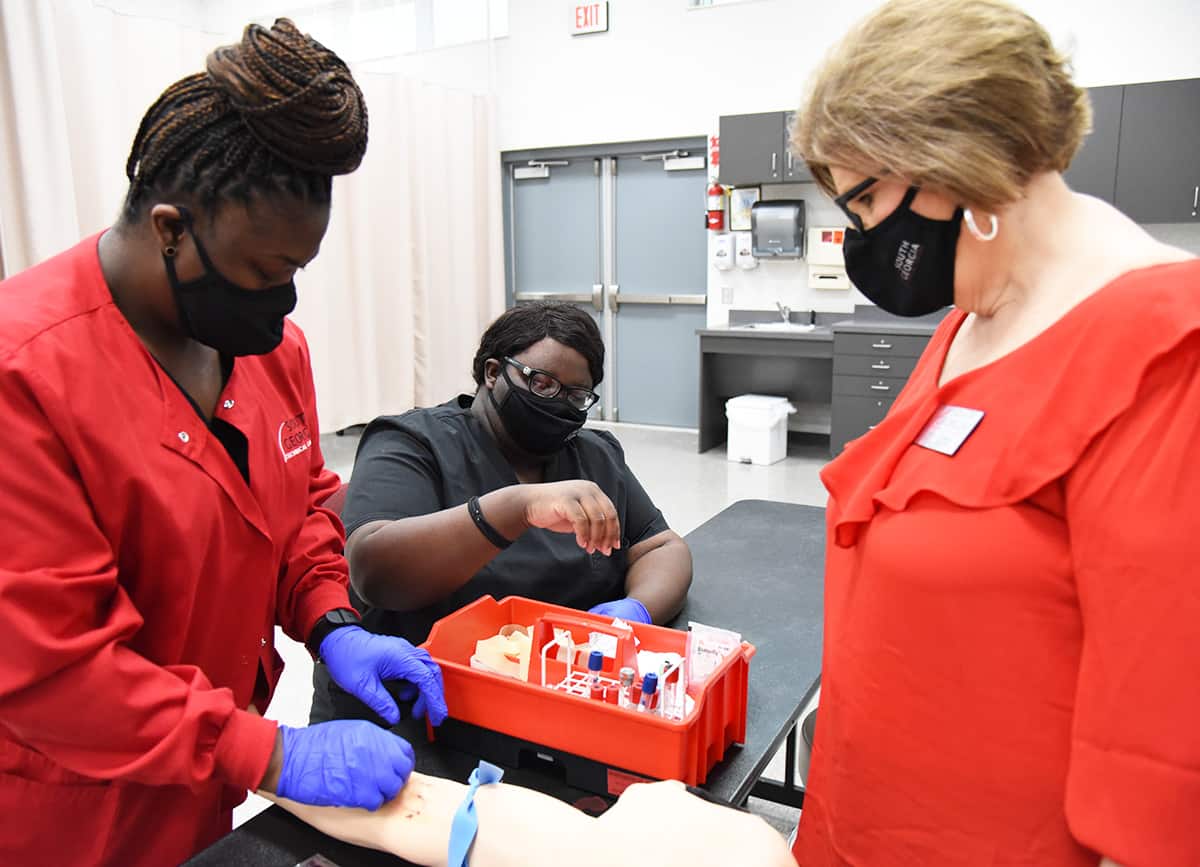How to Pass the Certification Exam After Your Phlebotomy Training Course
How to Pass the Certification Exam After Your Phlebotomy Training Course
Blog Article
The Path to Qualification: Understanding the Phlebotomy Educating Training Course Trip and Its Significance
As you consider the course to qualification in phlebotomy, it's vital to understand the duty you'll play in health care. Your training will cover important skills, from blood collection techniques to patient communication.

The Function of Phlebotomists in Healthcare
Phlebotomists play an important function in the healthcare system, functioning as the crucial link between clients and necessary analysis testing. You'll execute blood draws, making sure samples are collected properly and safely. Your knowledge helps in diagnosing clinical conditions, checking health and wellness, and leading therapy choices.
In your everyday interactions, you'll require to establish count on with people, making them feel comfy throughout what may be a difficult experience. You're liable for identifying and handling examples very carefully to stop contamination or errors, which can impact examination results.
Beyond this, you'll typically function along with physicians and registered nurses, communicating vital details regarding people' problems. By understanding your skills, you contribute meaningfully to client treatment, making you an essential part of the medical group.
Overview of Phlebotomy Training Programs
When discovering phlebotomy training programs, you'll locate numerous kinds created to fit various timetables and finding out designs. Each program aids you establish essential skills like blood collection and individual communication. Understanding these choices is key to selecting the ideal path for your job.
Sorts Of Educating Programs
Several types of training programs are available for those looking to end up being proficient in phlebotomy. Additionally, some hospitals and clinics offer on-the-job training programs, giving practical experience while you find out. Whatever course you select, each program intends to outfit you with the necessary abilities for an effective phlebotomy profession.

Secret Skills Established
Mastering phlebotomy requires a collection of vital abilities that are developed via extensive training programs. You'll find out technological skills like correct blood vessel choice, needle insertion, and blood collection strategies. These hands-on methods assure you can perform procedures safely and effectively. In addition, communication abilities are basic; you'll need to connect with clients, clarify procedures, and placed them at simplicity. Recognizing composition and physiology is essential, as well, as it helps you find blood vessels and comprehend the body's reaction to blood draws. You'll get expertise of security methods and infection control, ensuring you preserve a sterile atmosphere. Each of these abilities is crucial for your success as a qualified phlebotomist, making you a beneficial asset in any kind of medical care setting.
Key Elements of a Phlebotomy Course
In a phlebotomy training course, you'll concentrate on essential topics that lay the foundation for your future occupation. You'll take part in hands-on training that allows you to apply what you have actually learned in real-world settings. Both the core educational program and functional experience are crucial for your success as a phlebotomist.
Curriculum Overview
While pursuing a phlebotomy training program, you'll experience a curriculum designed to outfit you with basic skills and knowledge. Phlebotomy Courses Near Me. This curriculum typically consists of composition and physiology, concentrating on the blood circulation system and comprehending blood elements. You'll additionally discover various sorts of blood collection methods, consisting of venipuncture and capillary puncture strategies
In addition, infection control and safety and security methods are crucial elements, guaranteeing you know just how to maintain a clean and sterile atmosphere. You'll study patient interaction, emphasizing interaction and compassion, which are critical for reducing patient anxiousness.
Hands-On Training Experience
Getting hands-on experience is an essential part of your phlebotomy training program. This sensible training enables you to apply what you've learned in a real-world setting, improving your abilities and self-confidence. You'll practice venipuncture techniques, discover just how to handle various sorts of specimens, and get accustomed to the tools used in the area. Under the advice of seasoned instructors, you'll improve your skills, guaranteeing you're prepared for any situation you might face.
Additionally, you'll obtain the possibility to interact with clients, which is important for creating your interaction abilities. This mix of technical proficiency and interpersonal abilities is vital for your success as a qualified phlebotomist. Inevitably, hands-on training is where concept meets method, strengthening your knowledge and preparedness for accreditation.
Certification and Licensing Demands
Before you can start your job in phlebotomy, it is important to recognize the certification and licensing advice requirements that differ by state. Most states call for phlebotomists to hold a certification from an acknowledged organization, such as the National Phlebotomy Association or the American Culture for Medical Pathology. These certifications generally involve passing a test that tests your understanding and skills in the field.
In enhancement to certification, some states have certain licensing requirements. You may need to complete a specific variety of hours in scientific method, submit proof of training, or undertake a history check. It is vital to research your state's policies to make certain you satisfy all required criteria.
Remaining educated regarding these requirements not just helps you protect a placement yet additionally improves your integrity as an expert. By fulfilling these demands, you'll be well on your way to a successful occupation in phlebotomy.
Hands-On Training and Practical Experience
Hands-on training and practical experience are vital elements of your phlebotomy education, as they enable you to apply academic expertise in real-world situations. During your training, you'll engage in monitored venipuncture, find out appropriate methods, and come to be accustomed to numerous blood collection devices. This straight involvement is critical for building your confidence and refining your skills.
You'll work closely with experienced experts that can lead you through the subtleties of client communication and sample handling. Each session not only reinforces your understanding but also prepares you for the busy environment of medical care setups.
Furthermore, several programs incorporate medical rotations, permitting you to experience varied setups, from healthcare facilities to outpatient facilities. This exposure helps you adjust to different difficulties and individual requirements, ensuring you're well-prepared for your future function. Embrace these opportunities, as they're necessary to coming to be a competent and compassionate phlebotomist.
Difficulties Faced Throughout Training
While acquiring hands-on experience is crucial, it's crucial to acknowledge the difficulties that can emerge during your phlebotomy training. In addition, grasping the skills needed for blood draws takes method; you may have a hard time with method initially.
Time administration can also be an obstacle, as balancing theory, functional sessions, and personal commitments can feel challenging. You might encounter varying discovering rates among your peers, resulting in sensations of insecurity if you think you're falling behind. Adjusting to the various individualities of teachers can be difficult, as each may have an one-of-a-kind training style.
Identifying these obstacles early can prepare you for success and help you establish durability throughout your training journey.
Occupation Opportunities After Accreditation

As see page you obtain experience, you might even consider concentrating on locations like pediatric or senior citizen phlebotomy, satisfying certain individual needs. Some phlebotomists pick to progress their occupations by coming to be laboratory specialists or pursuing additional education in healthcare areas.
Furthermore, your accreditation can lead Learn More Here to duties in training or overseeing new phlebotomists, permitting you to share your understanding. With the health care market continuously expanding, your abilities will certainly always be in need, leading the way for a steady and meeting job. Embrace the opportunities waiting on you!
Often Asked Concerns
What Is the Normal Period of a Phlebotomy Educating Training Course?
Phlebotomy training programs usually last around four to 8 weeks. You'll participate in hands-on practice, classroom direction, and online understanding. Finishing this training prepares you for qualification and a fulfilling career in health care.
Are Online Phlebotomy Courses Available?
Yes, online phlebotomy programs are available. They use adaptability and convenience, enabling you to examine at your very own rate. Simply confirm the program is accredited to satisfy qualification demands and obtain important skills for your profession.
Just How Much Does Phlebotomy Training Usually Expense?
Phlebotomy training commonly sets you back between $700 and $2,500, depending on the program and area. You must consider aspects like training course length, consisted of products, and hands-on experience when selecting the right training for you.
What Prevail Requirements for Phlebotomy Training?
Typical requirements for phlebotomy training frequently consist of a secondary school diploma or GED, immunizations, and a history check. Some programs may also call for basic health care expertise or certifications, guaranteeing you're gotten ready for hands-on training.
Can I Work While Finishing My Phlebotomy Training?
Yes, you can function while finishing your phlebotomy training. Several pupils balance work with their studies, however ensure to manage your time successfully to assure you meet both job and training commitments efficiently.
Report this page